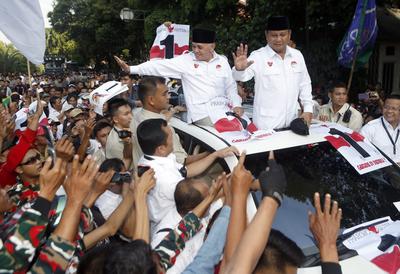When Yudhoyono came to office in 2004, he was following on from two reform-minded presidents. From a historical perspective, Indonesia should thank former president Abdurrahman Wahid for initiating domestic fuel price deregulation during his three-year term from 1999. Wahid began by setting fuel prices for large industries at 50 per cent of the international price with the intention of eventually moving to a fully deregulated market. Then president Megawati Sukarnoputri continued Wahid’s efforts and, by 2003, had successfully deregulated industry fuel prices, so that the domestic prices were in accordance with the international market. Both presidents had also regularly tried to deregulate retail fuel prices, but when Megawati left office in 2004 the deregulation policies had not yet been finalised.
Instead of having a long-term vision on energy policy, President Yudhoyono has irregularly adjusted the retail fuel prices with an ad hoc formula. This short-sighted policy approach was highlighted when retail fuel prices were cut three times in six months (June 2008–January 2009). If President Yudhoyono had regularly and consistently deregulated retail fuel prices, as Wahid and Megawati did, then Indonesia would not be in the fuel subsidy trap.
Fuel subsidies consistently dominate Indonesia’s economic and budgetary agenda. The Indonesian government was forced to cut the 2014 budget by US$8.7 billion to cover increases in fuel and electricity subsidies due to uncontrollable consumption. In the revised budget, energy subsidies drain around IDR392 trillion (US$ 34 billion), which is equivalent to 21.2 per cent of the total budget. This consists of IDR285 trillion (US$24.8 billion) for fuel subsidies and IDR107 trillion (US$9.6 billion) for electricity subsidies. Reallocating to fuel subsidies not only paralyses ministry activities but also adversely impacts the economy by reducing fiscal space; increasing the trade deficit; pressuring rupiah depreciation; increasing inequality; and promoting unproductive and environmentally damaging activities. This unclear vision and consequently disjointed policy making has led Indonesia into a fuel subsidy trap.
Currently, the best policy option is for the incumbent government to increase retail fuel prices to pave the way for the new government. Otherwise, the winner of 2014 presidential election will, in the face of political objection and challenges, have the difficult task of reining in fuel subsidies to increase fiscal space for financing socio-economic reforms.
Two presidential tickets, Joko ‘Jokowi’ Widodo and Jusuf Kalla (Jokowi-Kalla) and Prabowo Subianto and Hatta Rajasa (Prabowo-Hatta), pay close attention to this issue and both have agreed to cut fuel subsidies. While Prabowo-Hatta has promised to reduce subsidies, Jokowi-Kalla has clearly set a target to reduce and fully deregulate retail fuel prices within four years. Both tickets have indicated they will reallocate subsidy funding to productive activities and the poor, but Jokowi-Kalla has clearly stated the reallocation is for infrastructure developments.
Both have similar strategies to reduce the fuel subsidies by promoting gas and bio-energy. But Prabowo-Hatta proposes the challenging idea of imposing an excise tax to control fuel subsidies. This is similar to the idea of an excise tax to control tobacco consumption and is actually an indirect price increase. This is a subtle use of language: imposing an excise tax would be more acceptable than cutting subsidies. On the other hand, Jokowi-Kalla is seeking to explicitly encourage the automobile industry to develop alternative energy vehicles.
Comparing commitments, targets and strategies of the two tickets can be surprising. Despite a middle class and affluent support base, Prabowo-Hatta’s proposal is less technocratic and more populist than Jokowi-Kalla’s. Jokowi-Kalla would usually be expected to be more populist than technocratic, considering they are supported by the Indonesian Democratic Party of Struggle (PDI-P), the ‘partai wong cilik’ (the party of the little people). But these fuel subsidy policies may simply be campaign strategy, with Prabowo-Hatta seeking to attract wong cilik by being populist, while Jokowi-Kalla seeks to hook the middle class by being technocratic.
The question is: who will release Indonesia from the fuel subsidy trap? Both tickets will face difficulties and political objections in removing fuel subsidies. But looking at the history of Megawati’s reform on industrial fuel prices and Jusuf Kalla’s role in the conversion policy from kerosene to LPG during 2004–2009, Jokowi-Kalla has a high chance of success. A combination of a clear vision; measurable target and strategies; and strong, credible leadership can minimise political objections and challenges.
Teguh Dartanto is Head of Poverty and Development Studies at the Institute for Economic and Social Research (LPEM) and Director of Undergraduate Program in Economics at the University of Indonesia.


Thank you for a thoughtful comparison of policies on a vital and sensitive policy issue for Indonesia.
Salam,
Andrew
Thank you Andrew
I hope that the current government will cut subsidies to pave a way for the new government. I think then the elected president will give some position to SBY’s party.
Teguh
Abolishing fuel subsidy would realistically take at least double the 4 years that this new government predicts, in my opinion. Getting the US$30 billion or so from these fuel savings is but a simplistic short term foresight. In the long term, it is more worthwhile to commit gigantic infrastructure energy projects through various means of international financing. The immediate construction will accrue benefits to local businesses and workforce. The long term benefits will be distributed to the local population and economies. In these respect, I am in favour of proven technology like dam building for electricity, massive road infrastructure upgrade throughout the archipelago. On the micro level, better operation enforcement can be done for the use of the differentiated Premium and Pertamax petrol